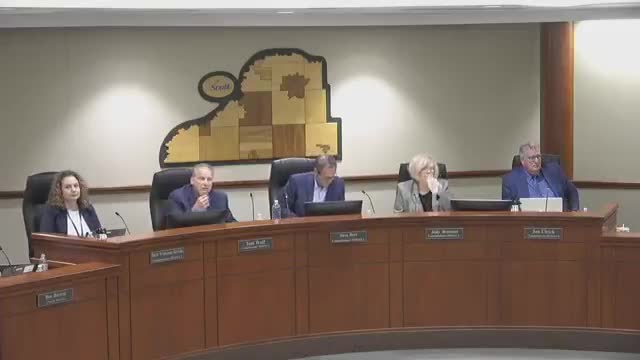Scott County panel discusses chemical health and substance use disorder strategies
June 20, 2025 | Scott County , Minnesota
This article was created by AI summarizing key points discussed. AI makes mistakes, so for full details and context, please refer to the video of the full meeting. Please report any errors so we can fix them. Report an error »

The Scott County Board of Commissioners convened on June 17, 2025, to address pressing issues surrounding chemical health and substance use disorder, a topic that resonates deeply within the community. The meeting featured a panel of experts from various departments and community organizations, emphasizing the need for a comprehensive approach to support residents struggling with addiction.
A key focus of the discussion was the importance of a continuum of care, which includes prevention, treatment, and recovery services. Panelists highlighted that investing in early intervention can significantly reduce the need for more intensive services later on, ultimately benefiting both individuals and the community at large. The presence of community partners, such as Damascus Way and the Drug Free Community Youth Advisory Committee, underscored the collaborative efforts being made to tackle these challenges.
One of the critical data points discussed was the increase in public health professionals in Scott County, contrasted with a decrease in county-employed mental health professionals. This shift raises concerns about the availability of mental health services, particularly for those in acute need. Panelists noted that while the county remains a significant provider, the growing number of community partners is a positive development, indicating a broader network of support.
The meeting also addressed the alarming rise in overdose deaths, particularly those linked to opioids and fentanyl. Public health officials shared strategies being implemented to combat this crisis, including marketing campaigns aimed at prevention and harm reduction. Initiatives such as the distribution of naloxone and fentanyl test strips are part of a broader effort to reduce fatalities associated with substance use.
Another significant topic was the transition from traditional detox services to a new withdrawal management system, which has changed how individuals access care. This shift has led to a decrease in detox admissions, as more people are now receiving treatment through facilities that can bill insurance, rather than relying solely on county-funded detox programs. While this change has improved access to care, it also highlights the need for ongoing evaluation of service delivery and outcomes.
The meeting concluded with discussions about expanding the Coordinated Response Program, which aims to provide mental health support to individuals encountered by law enforcement. This program is set to expand its reach across all jurisdictions in Scott County, funded through a combination of insurance billing, grants, and opioid settlement funds.
As Scott County continues to navigate the complexities of substance use disorder, the insights and strategies shared during this meeting reflect a commitment to enhancing community health and safety. The collaborative approach among county departments and community organizations aims to create a more supportive environment for residents facing these challenges, ultimately fostering a healthier community for all.
A key focus of the discussion was the importance of a continuum of care, which includes prevention, treatment, and recovery services. Panelists highlighted that investing in early intervention can significantly reduce the need for more intensive services later on, ultimately benefiting both individuals and the community at large. The presence of community partners, such as Damascus Way and the Drug Free Community Youth Advisory Committee, underscored the collaborative efforts being made to tackle these challenges.
One of the critical data points discussed was the increase in public health professionals in Scott County, contrasted with a decrease in county-employed mental health professionals. This shift raises concerns about the availability of mental health services, particularly for those in acute need. Panelists noted that while the county remains a significant provider, the growing number of community partners is a positive development, indicating a broader network of support.
The meeting also addressed the alarming rise in overdose deaths, particularly those linked to opioids and fentanyl. Public health officials shared strategies being implemented to combat this crisis, including marketing campaigns aimed at prevention and harm reduction. Initiatives such as the distribution of naloxone and fentanyl test strips are part of a broader effort to reduce fatalities associated with substance use.
Another significant topic was the transition from traditional detox services to a new withdrawal management system, which has changed how individuals access care. This shift has led to a decrease in detox admissions, as more people are now receiving treatment through facilities that can bill insurance, rather than relying solely on county-funded detox programs. While this change has improved access to care, it also highlights the need for ongoing evaluation of service delivery and outcomes.
The meeting concluded with discussions about expanding the Coordinated Response Program, which aims to provide mental health support to individuals encountered by law enforcement. This program is set to expand its reach across all jurisdictions in Scott County, funded through a combination of insurance billing, grants, and opioid settlement funds.
As Scott County continues to navigate the complexities of substance use disorder, the insights and strategies shared during this meeting reflect a commitment to enhancing community health and safety. The collaborative approach among county departments and community organizations aims to create a more supportive environment for residents facing these challenges, ultimately fostering a healthier community for all.
View full meeting
This article is based on a recent meeting—watch the full video and explore the complete transcript for deeper insights into the discussion.
View full meeting
